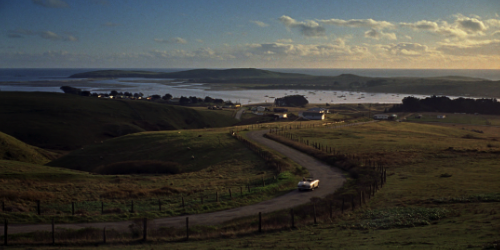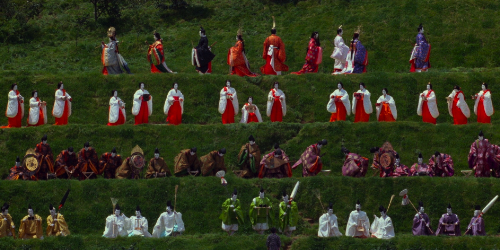In each of us there is, as it were, an ascesis, in part turned against ourselves. We are deserts, but populated by tribes, flora and fauna. We pass our time in ordering these tribes, arranging them in other ways, getting rid of some and encouraging others to prosper. And all these clans, all these crowds, do not undermine the desert, which is our very ascesis; on the contrary they inhabit it, they pass through it, over it.
Saturday, May 29, 2021
Thursday, May 13, 2021
Wednesday, May 5, 2021
Thursday, April 29, 2021
Immanence, Jack London, Buck
There is an ecstasy that marks the summit of life, and beyond which life cannot rise. And such is the paradox of living, this ecstasy comes when one is most alive, and it comes as a complete forgetfulness that one is alive. This ecstasy, this forgetfulness of living, comes to the artist, caught up and out of himself in a sheet of flame; it comes to the soldier, war-mad on a stricken field and refusing quarter; and it came to Buck, leading the pack, sounding the old wolf-cry, straining after the food that was alive and that fled swiftly before him through the moonlight. He was sounding the deeps of his nature, and of the parts of his nature that were deeper than he, going back into the womb of Time. He was mastered by the sheer surging of life, the tidal wave of being, the perfect joy of each separate muscle, joint, and sinew in that it was everything that was not death, that it was aglow and rampant, expressing itself in movement, flying exultantly under the stars and over the face of dead matter that did not move.
The "summit of life", the apex, this "complete forgetfulness" is immanence of course, but also maps to the apex of the normal distribution, the tip of gabriel's horn even, the point of inscription that is the minutest cylinder/cone of infinite length but finite volume, the point at which "In the Penal Colony" the inscription of the sentence/judgement is contemporaneous with death.
Sunday, April 11, 2021
Ahab
Bungle away at it then, and bring it to me (turns to go). Oh, Life! Here I am, proud as Greek god, and yet standing debtor to this blockhead for a bone to stand on! Cursed be that mortal inter-indebtedness which will not do away with ledgers. I would be free as air; and I’m down in the whole world’s books. I am so rich, I could have given bid for bid with the wealthiest Prætorians at the auction of the Roman empire (which was the world’s); and yet I owe for the flesh in the tongue I brag with. By heavens! I’ll get a crucible, and into it, and dissolve myself down to one small, compendious vertebra. So.
Friday, March 26, 2021
Fitzgerald on Crack
"Instead of being so sorry for yourself, listen—"she said. (She always says "Listen," because she thinks while she talks—really thinks.) So she said: "Listen. Suppose this wasn't a crack in you—suppose it was a crack in the Grand Canyon."
"The crack's in me," I said heroically.
"Listen! The world only exists in your eyes—your conception of it. You can make it as big or as small as you want to. And you're trying to be a little puny individual. By God, if I ever cracked, I'd try to make the world crack with me. Listen! The world only exists through your apprehension of it, and so it's much better to say that it's not you that's cracked—it's the Grand Canyon."
Wednesday, February 17, 2021
Saturday, February 13, 2021
El Aleph
On the back part of the step, toward the right, I saw a small iridescent sphere of almost unbearable brilliance. At first I thought it was revolving; then I realised that this movement was an illusion created by the dizzying world it bounded. The Aleph’s diameter was probably little more than an inch, but all space was there, actual and undiminished. Each thing (a mirror’s face, let us say) was infinite things, since I distinctly saw it from every angle of the universe. I saw the teeming sea; I saw daybreak and nightfall; I saw the multitudes of America; I saw a silvery cobweb in the center of a black pyramid; I saw a splintered labyrinth (it was London); I saw, close up, unending eyes watching themselves in me as in a mirror; I saw all the mirrors on earth and none of them reflected me; I saw in a backyard of Soler Street the same tiles that thirty years before I’d seen in the entrance of a house in Fray Bentos; I saw bunches of grapes, snow, tobacco, lodes of metal, steam; I saw convex equatorial deserts and each one of their grains of sand; I saw a woman in Inverness whom I shall never forget; I saw her tangled hair, her tall figure, I saw the cancer in her breast; I saw a ring of baked mud in a sidewalk, where before there had been a tree; I saw a summer house in Adrogué and a copy of the first English translation of Pliny — Philemon Holland’s — and all at the same time saw each letter on each page (as a boy, I used to marvel that the letters in a closed book did not get scrambled and lost overnight); I saw a sunset in Querétaro that seemed to reflect the colour of a rose in Bengal; I saw my empty bedroom; I saw in a closet in Alkmaar a terrestrial globe between two mirrors that multiplied it endlessly; I saw horses with flowing manes on a shore of the Caspian Sea at dawn; I saw the delicate bone structure of a hand; I saw the survivors of a battle sending out picture postcards; I saw in a showcase in Mirzapur a pack of Spanish playing cards; I saw the slanting shadows of ferns on a greenhouse floor; I saw tigers, pistons, bison, tides, and armies; I saw all the ants on the planet; I saw a Persian astrolabe; I saw in the drawer of a writing table (and the handwriting made me tremble) unbelievable, obscene, detailed letters, which Beatriz had written to Carlos Argentino; I saw a monument I worshipped in the Chacarita cemetery; I saw the rotted dust and bones that had once deliciously been Beatriz Viterbo; I saw the circulation of my own dark blood; I saw the coupling of love and the modification of death; I saw the Aleph from every point and angle, and in the Aleph I saw the earth and in the earth the Aleph and in the Aleph the earth; I saw my own face and my own bowels; I saw your face; and I felt dizzy and wept, for my eyes had seen that secret and conjectured object whose name is common to all men but which no man has looked upon — the unimaginable universe.
Tuesday, February 2, 2021
Moby Dick / Lucretius
Come, Ahab’s compliments to ye; come and see if ye can swerve me. Swerve me? ye cannot swerve me, else ye swerve yourselves! man has ye there. Swerve me? The path to my fixed purpose is laid with iron rails, whereon my soul is grooved to run.
- Herman Melville
Thursday, January 7, 2021
Friday, January 1, 2021
Friday, December 11, 2020
Friday, November 13, 2020
Emerson, via BKR
"There is a process in the mind very analogous to crystallization in the mineral kingdom. I think of a particular fact of singular beauty and interest. In thinking of it I am led to many more thoughts which show themselves, first partially, and afterwards more fully. But in the multitude of them I see no order. When I would present them to others they have no beginning. There is no method. Leave them now, and return to them again. Domesticate them in your mind, do not force them into arrangement too hastily, and presently you shall find they will take their own order. And the order they assume is divine. It is God's architecture." - Journals, Jan 7, 1832
Sunday, October 11, 2020
"I am no longer myself but thought's aptitude for finding itself and spreading across a plane that passes through me at several places" (WIP:64)
This operation takes place as if the personae were so many divers, descending from the plane of immanence into the sea below, where singularities lie scattered like so many stray pearls. Braving the depths, the personae collect these shimmering ordinates (chiffres) and then return to the surface, where these singularities will be thrown on a table of immanence like "a handful of dice from chance-chaos" (Flaxman 2019, WIP:75)
Giant Steps
Thursday, September 3, 2020
Sunday, May 24, 2020
On Friendship
Gregg Flaxman, 2005
Sunday, May 3, 2020
Monday, April 20, 2020
Free Solo
https://fsharetv.co/movie/free-solo-episode-1-tt7775622
Saturday, April 4, 2020
Sunday, March 8, 2020
wolves on love
A pack of forever variable intensities, wolves express the way bodies
are continually composed and recomposed through desire. They are
linked together as a multiplicity in which ‘each element ceaselessly
varies and alters its distance in relation to the others’ (Deleuze and
Guattari 2004: 34). To become-wolf is to surrender the unity of
the supreme self to the multiplicities that make the subject but one
intensity in a larger pack. Held together and fueled by desire, such
packs are fluent and irreducible to the One. This is also how we must
understand making love. To love somebody is ‘to find that person’s
own packs’. These packs are the multiplicities enclosed within that
person. Love is joining these multiplicities together, ‘to make them
penetrate mine, and for me to penetrate the other person’s’ (Deleuze
and Guattari 2004: 39). Such ‘heavenly nuptials’, created by moving
through so many bodies in each other, is making love through a
body without organs (Deleuze and Guattari 2004: 40).
Wednesday, February 12, 2020
on repetition
general, a universality opposed to the particular, a distinctive opposed to
the ordinary, an instantaneity opposed to variation, and an eternity
opposed to permanence. In every respect, repetition is a transgression. It
puts law into question, it denounces its nominal or general character in
favor of a more profound and more artistic reality. (DR 2-3)
Tuesday, February 4, 2020
deleuze on art
Sunday, February 2, 2020
Trancendental Empiricism
Sunday, December 1, 2019
Sunday, November 10, 2019
Sunday, October 13, 2019
becoming
and haunches had mingled into a lovely musk; their eyes had
been furtive, their lips relaxed, and the delicate turn of their
heads on those slim black necks had been like nothing other
than a doe’s. Their laughter had been more touch than
sound.
Then they had grown. Edging into life from the back
door. Becoming.
- The Bluest Eye, Toni Morrison
Wednesday, July 17, 2019
It's a Power Constellation: Macolm Gladwell on Country Music
“THE THING THAT PUSHES US OVER THE TOP INTO TEARS IS DETAILS. WE CRY WHEN MELANCHOLY COLLIDES WITH SPECIFICITY. AND SPECIFICITY IS NOT SOMETHING EVERY GENRE DOES WELL.”
“THAT’S HOW YOU GET TEARS. YOU MAKE THE STORY SO REAL AND THE DETAILS SO SHARP AND YOU ADD IN SO MANY EMOTIONAL TRIGGERS THAT THE LISTENER CANNOT ESCAPE…[IT’S] FAR EASIER JUST TO FALL BACK ON THE BLAND CLICHE THAT ‘WILD HORSES COULDN’T DRAG YOU AWAY.’ COUNTRY MUSIC MAKES PEOPLE CRY BECAUSE IT’S NOT AFRAID TO BE SPECIFIC.”
https://twitter.com/ninthstbakery/status/1155483383864201216
Wednesday, June 19, 2019
Wednesday, June 5, 2019
James Salter, a Sport and a Pastime
"The sum of small acts begins to unite them, the pure calculus of love."
Monday, April 8, 2019
Saturday, April 6, 2019
A Ring in Which Combray was Locked
-- Marcel Proust, Swann's Way
Friday, March 22, 2019
Deleuze #1
Wednesday, March 20, 2019
Monday, February 18, 2019
Wednesday, February 6, 2019
possession, delusion, vision, hypnotism, trance, hallucination, and narcosis
G-d inscribes a "law" in us that makes us equal to the incredible variety of nature.
-- from Gregory Flaxman, "This is Your Brain on Cinema"
Monday, January 28, 2019
Monday, January 21, 2019
Parallax, or the Story of the Three Steeples
Monday, January 7, 2019
Sunday, January 6, 2019
Sunday, December 30, 2018
Thursday, October 25, 2018
Wednesday, October 17, 2018
Monday, October 15, 2018
Wednesday, October 10, 2018
Sunday, September 30, 2018
Friday, September 7, 2018
Wednesday, September 5, 2018
Singularity
Thursday, August 30, 2018
Wednesday, August 22, 2018
Friday, August 3, 2018
Saturday, July 21, 2018
Wednesday, July 11, 2018
Wednesday, June 6, 2018
Thursday, May 31, 2018
Love had a thousand shapes
"She was not inventing; she was only trying to smooth out something she had been given years ago folded up; something she had seen."
- Virginia Woolf, To the Lighthouse
Sunday, May 20, 2018
Sunday, May 6, 2018
Sunday, April 29, 2018
Sunday, April 15, 2018
Tuesday, April 10, 2018
Tuesday, March 13, 2018
Sunday, February 4, 2018
Monday, January 29, 2018
Proust
Saturday, January 6, 2018
Wednesday, August 16, 2017
Sunday, June 25, 2017
Wednesday, May 3, 2017
Saturday, April 15, 2017
Agnes Martin
Thursday, April 13, 2017
Sunday, April 9, 2017
Sunday, March 12, 2017
Saturday, March 11, 2017
Sunday, March 5, 2017
Wednesday, December 28, 2016
Sunday, December 18, 2016
Tuesday, December 13, 2016
Tuesday, November 22, 2016
Wednesday, November 9, 2016
Wednesday, October 5, 2016
Monday, September 26, 2016
Chaplin's Desires
– Charlie Chaplin
Friday, August 19, 2016
Friday, July 15, 2016
Tuesday, June 14, 2016
Sunday, April 24, 2016
Thursday, March 10, 2016
Bartleby
Sunday, December 27, 2015
Split the duchies / Have you seeing doubles like Noah
Thursday, December 10, 2015
Ginger is a Tuber
-Herman Melville, "Bartleby, the Scrivener"










